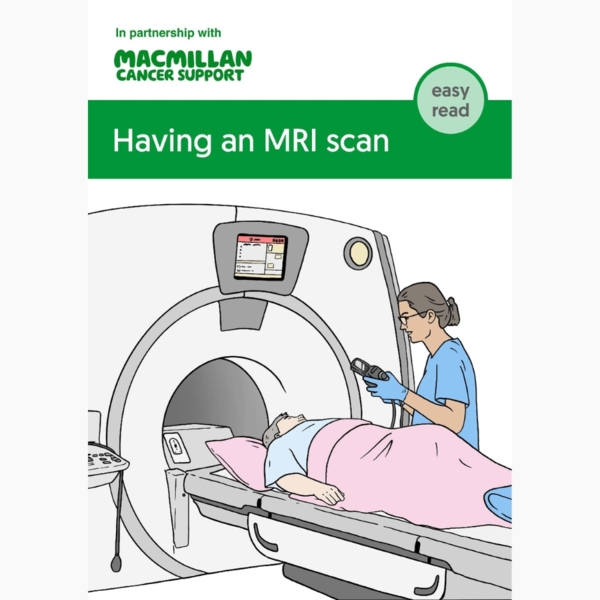MRI scan
What is an MRI scan?
An MRI scan uses magnetism to build up a detailed picture of areas of the body. The person who does the scan is called a radiographer.
Doctors may use an MRI scan to find out:
- whether a lump or abnormal area is cancer
- the size of a cancer and whether it has spread.
The scanner is a powerful magnet. You will be asked to complete and sign a checklist to make sure it is safe for you. This will check whether you have:
- any metal implants, such as surgical clips, bone pins, artificial joints or heart valves
- any electrical implants, such as a pacemaker, implanted defibrillators, nerve stimulators or cochlear implants.
You should also tell your doctor or radiographer if you have ever worked with metal. This is because tiny bits of metal can sometimes lodge in the body.
Having metal in your body does not always mean you cannot have an MRI scan. Your doctor and radiographer will decide whether it is safe for you. If you cannot have an MRI scan, they may use another type of scan.
Some tattoo ink contains traces of metal. Nearly all tattoos are safe. But if you feel any discomfort or heat in your tattoo during the MRI scan, tell the radiographer straight away.
You should tell the radiographer before the scan if you are pregnant or think you could be.
Related video
Before an MRI scan
You will get an appointment letter telling you whether you need to do anything to prepare for the scan. You should take any medicines as normal unless you are told otherwise.
You may be able to eat and drink as normal before the scan. Or you may be asked not to eat or drink for up to 4 hours before the scan. This will depend on which part of the body is being scanned. Sometimes you are asked to drink some water before the scan.
You have the scan in the x-ray department at the hospital. The hospital staff will ask you to remove any metal objects, such as jewellery and hair clips. They may ask you to change into a hospital gown.
If you worry about being in small spaces (are claustrophobic), you may be able to have a sedative to help you relax. Talk to your GP or cancer doctor about this before the scan.
Having an MRI scan
During the scan, you need to lie still on a bed inside a cylinder (tube). The bed moves slowly inside the scanner. The radiographer is in a separate room, but you can hear and speak to them.
The scan usually lasts between 15 minutes and 1 hour. It is painless, but you may find it uncomfortable to lie still for that long. The scan is noisy, but you will be given earplugs or headphones. You may be able to listen to music during the scan.
During the scan, the radiographer may give you an injection of a dye into a vein in your arm. This is called a contrast. It helps show certain areas of the body more clearly on the scan. The radiographer or doctor will tell you more about this. It does not usually cause discomfort.
After the scan, you can usually go home.
If you had a sedative, you should:
- not drive for 24 hours
- have someone to take you home
- have someone to stay with you overnight.
Date reviewed
This content is currently being reviewed. New information will be coming soon.

Our cancer information meets the PIF TICK quality mark.
This means it is easy to use, up-to-date and based on the latest evidence. Learn more about how we produce our information.




